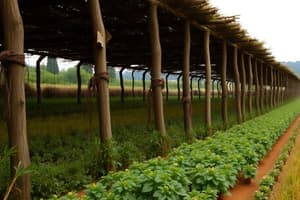Podcast
Questions and Answers
Food security is the ability of a country to provide ______ for commodities needed by the population and to guarantee a low limit of the needs regularly.
Food security is the ability of a country to provide ______ for commodities needed by the population and to guarantee a low limit of the needs regularly.
food
A country can achieve food security through the increase in the production of ______ commodities locally.
A country can achieve food security through the increase in the production of ______ commodities locally.
food
Food problems are an acute problem for ______ countries; conversely, developed countries can import their food needs from abroad.
Food problems are an acute problem for ______ countries; conversely, developed countries can import their food needs from abroad.
developing
The majority of the population suffering from starvation and malnutrition is concentrated in ______ and Asia.
The majority of the population suffering from starvation and malnutrition is concentrated in ______ and Asia.
The physical factors of food problems include insufficient ______ and the extensive of arable land is not properly exploited.
The physical factors of food problems include insufficient ______ and the extensive of arable land is not properly exploited.
Developed countries represent ______ of the world's population and produce 60% of the world's food production.
Developed countries represent ______ of the world's population and produce 60% of the world's food production.
The highest percentage of increase in food production was in the ______, Australia, and the Middle East.
The highest percentage of increase in food production was in the ______, Australia, and the Middle East.
Two thirds of the developing countries have a ______ decrease in food levels.
Two thirds of the developing countries have a ______ decrease in food levels.
Countries with a food surplus include ______.
Countries with a food surplus include ______.
Countries experiencing continuous food shortages and limited capability to import food due to ______ include Somalia, Central Africa, Ethiopia, and Chad.
Countries experiencing continuous food shortages and limited capability to import food due to ______ include Somalia, Central Africa, Ethiopia, and Chad.
Flashcards are hidden until you start studying
Study Notes
Food Security
- Food security is the ability of a country to provide food for its population and ensure a low limit of unmet needs regularly.
- Food security can be achieved through increasing local food production and using export revenue to import commodities to compensate for local production deficits.
Global Food Problems
- Food problems are an international issue, but are particularly acute in developing countries.
- 1/3 of the world's population has good nutrition, while 2/3 suffer from starvation and malnutrition.
- Food shortage means insufficient quantities of food, while malnutrition refers to the absence of a balanced diet.
Causes of Food Problems
Physical Factors
- Insufficient water supply
- Underutilization of arable land (common in third-world countries)
Human Factors
- High population growth rate in developing countries (five times that of developed countries)
- Income disparity between developed and developing countries
Food Production and Consumption
- Food demand in developing countries increases by 3% annually.
- Food production in developing countries has increased over the last three decades, but individual share of food production is lower than in developed countries.
- Developed countries (30% of the world's population) produce 60% of the world's food.
Regional Food Production
- In 1992, world food production increased by 1%, with the highest growth rates in the USA, Australia, and the Middle East.
- Food levels have sharply decreased in most developing countries, with the highest decline in Africa.
- Eastern Europe and Central Asia experienced food shortages due to drought.
Global Food Situation
- The world can be divided into three groups:
- Countries with food surpluses (e.g., Argentina)
- Countries with food shortages in certain commodities (e.g., Western Europe, Japan)
- Countries experiencing continuous food shortages and limited import capabilities (e.g., Somalia, Central Africa, Ethiopia, Chad)
Studying That Suits You
Use AI to generate personalized quizzes and flashcards to suit your learning preferences.




